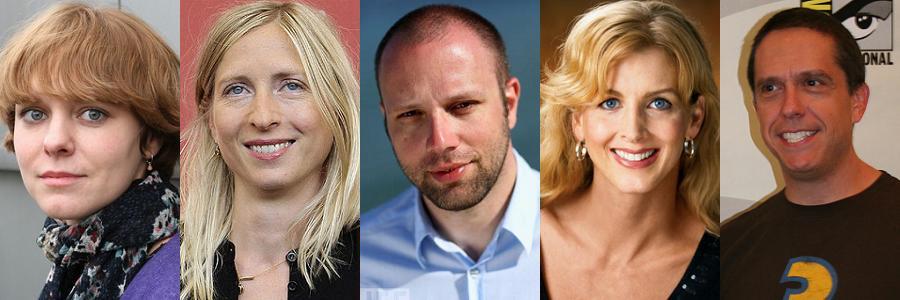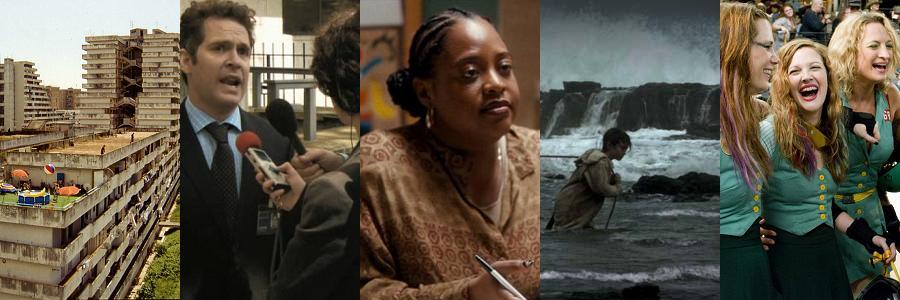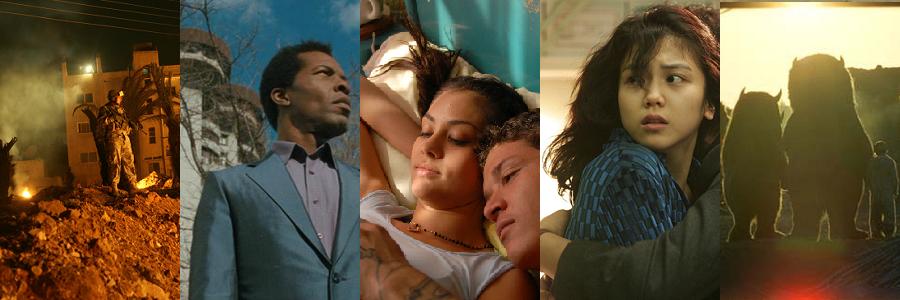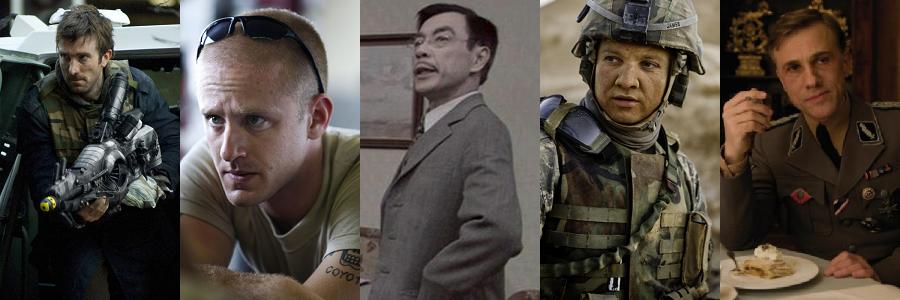The Fifties for 2010: Sound and Editing
Best Sound (Mixing and Editing)

Sam Petty and Richard Pain for Animal Kingdom, for working creatively across music, ambient details, and abstract sound, as in that unsettling electric hum underneath... Air Supply?;
Francesco Liotard, Paolo Amici, David Quadroli, and Fabrizio Quadroli for I Am Love, for sounds of eating and food prep to give the gastroporn images some grounding, and for pushing so boldly with those John Adams elements;
Richard King, Gary Rizzo, Ed Novick, Paul Berolzheimer, Michael W. Mitchell, and Bryan O. Watkins for Inception, because even when I start getting leery of the Christopher Nolan Wall of Sound, it turns out to have meaningful layers and emotional potency;
Tye Bellar, Aaron Irons, Eric Lehning, and David Rowland for Make-Out with Violence, for accomplishing something glossy, exuberant, and disturbing on a tight budget, and figuring out how to make a wall-to-wall song score work; and
Paul Hsu, Warren Shaw, Philip Stockton, William Sarokin, Jeffrey J. Haboush, Scott Millan, Greg P. Russell, Peter Staubli, Jacob Ribicoff, Jon Title, and Allan Zaleski (!!) for Salt, a great argument for having many cooks in the kitchen, giving the stunts and scuffles sonic impact and maintaining the key of deadpan camp.
Honorable mentions to two films that hopefully didn't get pipped for the mere fact that I saw them a while ago: Green Zone, with a team headed by Oliver Tarney, Simon Hayes, Mike Prestwood-Smith, Simon Trundle, and James Boyle, might have qualified for the usual Loud Noises slot, but like the best Loud Noises movies, the work here is detailed, varying in density and modulation, and specific to its environment; and Fish Tank, with its smaller crew headed by Joakim Sundström, Per Boström, Rashad Omar, and Christer Melén, which doesn't carry its sound design to the unnerving heights of Red Road but weaves deftly back and forth between realism and a heightened sensory awareness.
Best Film Editing

Yorgos Mavropsaridis for Dogtooth, because despite all the lengthy shots, the timing of the jokes, the shocks, the pauses, and the close-ups has to be ace for the film to work;
Marion Monnier for The Father of My Children, for nailing the desultory rhythms of daily life, in times of peace and stress, as well as the dark, quiet character and story arcs beneath;
Hervé de Luze for The Ghost Writer, because from the first ferry-ride and the publishing-house meeting, we know we've a taut, witty suspenser in store, even when the script sags;
Maryann Brandon and Darren T. Holmes for How to Train Your Dragon, which could easily have jerked between set-pieces and draggy interludes of hiding and waiting, but the whole thing pops, soars, and delights; and
Shannon Kennedy and Kimberly Reed for Prodigal Sons, for shifting smoothly from a specific occasion to unpredictable events, and using the cuts to signal the echoes between two main storylines.
(I am aware, by the way, of the arguments against animated features being considered for editing awards, given that the storyboarding is so intensive and the amount of footage produced is generally more commensurate with what ultimately goes into the film. Even if this amounts to a conceptual form of "in-camera editing" where shot relations, alternations in perspective, and montage largely need to be worked out in advance—which still leaves open the matters of precise timing, cross-cutting, etc.—I still prefer to recognize successes in a different kind of process that winds up constituting its own form of "editing.")
Extremely honorable mentions, so much so that I'd probably swap them in for some of the above on a different day: Sarah Anderson for Accomplices, the best film I keep mentioning that nobody saw, and a miraculous proof that you can tell a bifurcated past-tense and present-tense movie and make both tracks exciting and detailed; Luke Doolan for Animal Kingdom, who repeatedly helps to endow genre-bound scenes with engaging off-rhythms and palpable tension; Teresa Hannigan for Cairo Time, who makes brave choices for unfilled silences and static longueurs, capturing how the leads are comfortable as well as uncomfortable with each other, all the time; Moon Sae-kyoung for Mother, who takes a risk on a heavily story-boarded feel but works adroitly with character details and with abstract crystallizations of mood and feeling; Tom Fulford and Chris King, who make Exit Through the Gift Shop such swinging fun even in its thinner passages; Heike Parplies for the consummate handling of psychology and pacing in Everyone Else; and Christopher Rouse, whose intercutting of multiple colliding courses of action at the end of Green Zone was the pulse-pounding action climax of the year so far, a whole worth more than the sum of its exciting parts.
Honorable mentions, too, to Nicolas Chaudeurge for Fish Tank, Tim Streeto for Greenberg, Nicolas Chaudeurge for Fish Tank, the ever-dependable Juliette Welfling for A Prophet, Karina Ressler for Lourdes, Ken Schretzmann for Toy Story 3, and Walter Fasano for I Am Love.
Labels: Documentary, Editing, Fifties, Inception, Movies of 2010, Prodigal Sons, Sound
 Nick's Flick Picks: The Blog
Nick's Flick Picks: The Blog












 Will wonders never cease? A review on the same day a movie opens in my local market, and in several others. I have a plant in the Hollywood ecosystem to thank for my rare access to a pre-release screening, and Glenn Dunks to thank for beating the drum so long and loud for this title. In every other respect, I have David Michôd to thank for making such an entertaining and aesthetically ingratiating movie. I can't easily think of anyone to whom I wouldn't recommend Animal Kingdom, an engaging yarn told with formal finesse. My full review is
Will wonders never cease? A review on the same day a movie opens in my local market, and in several others. I have a plant in the Hollywood ecosystem to thank for my rare access to a pre-release screening, and Glenn Dunks to thank for beating the drum so long and loud for this title. In every other respect, I have David Michôd to thank for making such an entertaining and aesthetically ingratiating movie. I can't easily think of anyone to whom I wouldn't recommend Animal Kingdom, an engaging yarn told with formal finesse. My full review is 












 When I start writing one thing, I start writing everything, but you all know that by now. Still hard at work on my book manuscript, from which I thought I was just taking a 145-minute break in order to watch James Cameron's
When I start writing one thing, I start writing everything, but you all know that by now. Still hard at work on my book manuscript, from which I thought I was just taking a 145-minute break in order to watch James Cameron's 














